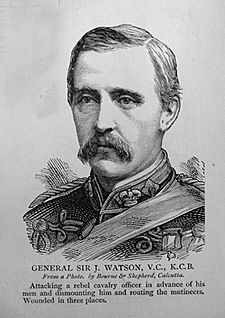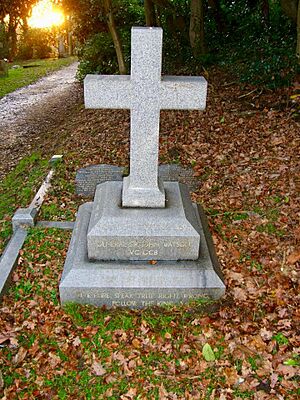John Watson (Indian Army officer) facts for kids
Quick facts for kids
John Watson
|
|
|---|---|
 |
|
| Born | 6 September 1829 Chigwell, Essex |
| Died | 23 January 1919 (aged 89) Finchampstead, Berkshire |
| Buried |
St James Churchyard, Finchampstead
|
| Allegiance | |
| Service/ |
|
| Years of service | 1848–? |
| Rank | General |
| Commands held | 4th Sikh Irregular Cavalry |
| Battles/wars | |
| Awards | |
General Sir John Watson was a brave English general who received the Victoria Cross. This is the highest award for bravery given to soldiers in Britain and the Commonwealth. He was an officer in the Bengal Army, which was part of the British forces in India. Watson earned his Victoria Cross for his actions during a major conflict in India called the Indian Mutiny, specifically in a place called Lucknow. He later rose to the rank of general in the British Indian Army. Sir John Watson was born on 6 September 1829 and passed away on 23 January 1919.
Contents
Early Life and First Battles
John Watson was born on 6 September 1829 in Chigwell, a town in Essex, England. His father's name was William George Watson.
When he was 19, John decided to join the British East India Company's army in 1848. He became an officer in the Bengal Army, which was a part of the British forces in India. He first went to Madras, but he wanted more action, so he moved to Bombay.
His first experience in battle was in December 1848 during the Second Anglo-Sikh War. Watson took part in the Siege of Multan. Soon after, he also fought in the Battle of Gujrat. By the early 1850s, he was a leader in the 1st Punjab Cavalry. A famous officer, Frederick Roberts, said that Watson was "one of the most promising officers."
Bravery and the Victoria Cross
Watson showed great bravery during the Indian Mutiny (also known as the Indian Rebellion of 1857). This was a big uprising against British rule in India.
On 14 November 1857, during the Relief of Lucknow, Watson performed an act of incredible courage. He was leading a group of cavalry soldiers. They were attacked by a large group of enemy cavalry. Even though he was alone and facing many enemies, Watson bravely charged forward. He fought off several attackers, killing one of their leaders. This brave action helped his unit escape danger.
For this act of gallantry, Watson was awarded the Victoria Cross. This is the highest military award for bravery in the United Kingdom.
Later Military Career
After his heroic actions, Watson returned to England for a short break to recover. He then went back to India. In 1858, he formed a new cavalry unit called the 4th Sikh Irregular Cavalry. This unit later became known as the 6th Duke of Connaught's Own Lancers (Watson's Horse).
Watson continued to serve in important roles. He took part in the Umbeyla Expedition in 1863. He also commanded the Central India Horse in 1871. He served as an assistant to the Governor-General in Baroda from 1882 to 1886. For his service, he was made a Knight Commander of the Order of the Bath (KCB) in 1886. This meant he could use the title "Sir."
In 1879–80, he commanded a group of soldiers in the Second Anglo-Afghan War. In 1891, he was promoted to the high rank of general. He was further honored in 1902 when he became a Knight Grand Cross of the Order of the Bath (GCB). King Edward VII personally gave him this award.
Death and Legacy
Sir John Watson passed away on 23 January 1919, at the age of 89. He died in Finchampstead, a village in Berkshire, England. His grave can be found in the churchyard of St James in the same village.
His Victoria Cross medal is on display for everyone to see. You can find it in the Lord Ashcroft Gallery at the Imperial War Museum in London.
 | May Edward Chinn |
 | Rebecca Cole |
 | Alexa Canady |
 | Dorothy Lavinia Brown |


